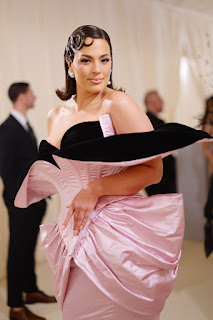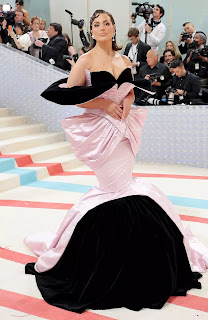by Emily Duff
The Met Gala is always a big deal, but this year it all felt a little… different. With controversy surrounding the theme, the event sparked discussions about size inclusivity in the fashion industry.
The Met Gala is an annual fundraiser for the Metropolitan Museum of Art's Costume Institute, raising over eight figures per event.
Meticulously curated by Anna Wintour since 1995, the Met Gala is often nicknamed the "Super Bowl of fashion" and is traditionally timed to mark the opening of its annual fashion exhibition.
This year's theme being “Karl Lagerfeld: A Line of Beauty’ with the dress code simply "In Honor of Karl”, payed tribute to the late designer.
While his impact on the industry is undeniable, having produced items for Balmain, Patou, Chloé, Fendi, Chanel, and his own eponymous brand, the theme came paired with outrage.
Lagerfeld held many controversial beliefs which he didn’t shy to vocalise.
In regards to the MeToo movement, Lagerfeld stated, "I'm fed up with it.”
When defending Interview magazine creative director against sexual misconduct allegations, he claimed, "If you don't want your pants pulled about, don't become a model!"
Lagerfeld was also incredibly fatphobic, stating, "no one wants to see curvy women on the runway", and publicly critiquing supermodel Heidi Klum, who he claimed was "simply too heavy and has too big a bust".
In fact, Jameela Jamil publicly criticised the “distinctly hateful" way Lagerfeld used his platform to attack marginalised groups and public figures throughout his career.
Therefore, the question remains up for debate: can we separate the art from the artist?
One person who made a statement at the event was model Ashley Graham, known for her activism and advocacy for body positivity.
Ahead of her appearance, Graham took to TikTok to state, "It's my fourth Met and this might be my most dramatic Met of them all – and iconic”.
Graham, often labeled as "plus-sized" in the industry, collaborated with British designer Harris Reed to create a structural Barbie pink satin corseted trumpet gown with black velvet detailing which beautifully accentuated her body.
This look was paired with mismatched earrings: one silver dangling diamond and pearl, and one stud featuring an ornate cluster of pearls. She finished the look by framing pieces of hair from her freshly-cut chin-length bob.
Reed, known for his fluid and gender-neutral designs, said that working with Graham was "serendipitous," as she “embodied everything” he stands for - confidence, curves, and the beauty in everything.
Sticking the the theme, the pair drew inspiration from '80s Chanel Haute Couture. "Together, we've created a powerful moment blending Lagerfeld's grace with Harris Reed's signature fluidity," wrote Graham.
Graham, who recently told PEOPLE that she's still "fighting" for model size diversity on the runway, looked stunning in her dress and spoke about feeling beautiful on the red carpet.
Despite Lagerfeld's fatphobic comments, Graham's appearance at the Met Gala was a moment of triumph for those who have been fighting for more inclusivity in the fashion world.
As the Kar-Jenner craze wanes and authenticity becomes more important to Gen-Z, it's time to re-evaluate our idolization of individuals. We should celebrate those who use their platform to promote positivity and inclusivity, like Ashley Graham, rather than those who perpetuate harmful beliefs and stereotypes under the lens of facetune and photoshop.
The fashion industry has a long way to go when it comes to size and weight inclusivity, but events like the Met Gala can spark important conversations and bring attention to those who are making a difference. Let's hope that future events will continue to celebrate a diverse range of body types and promote a more inclusive fashion industry.



